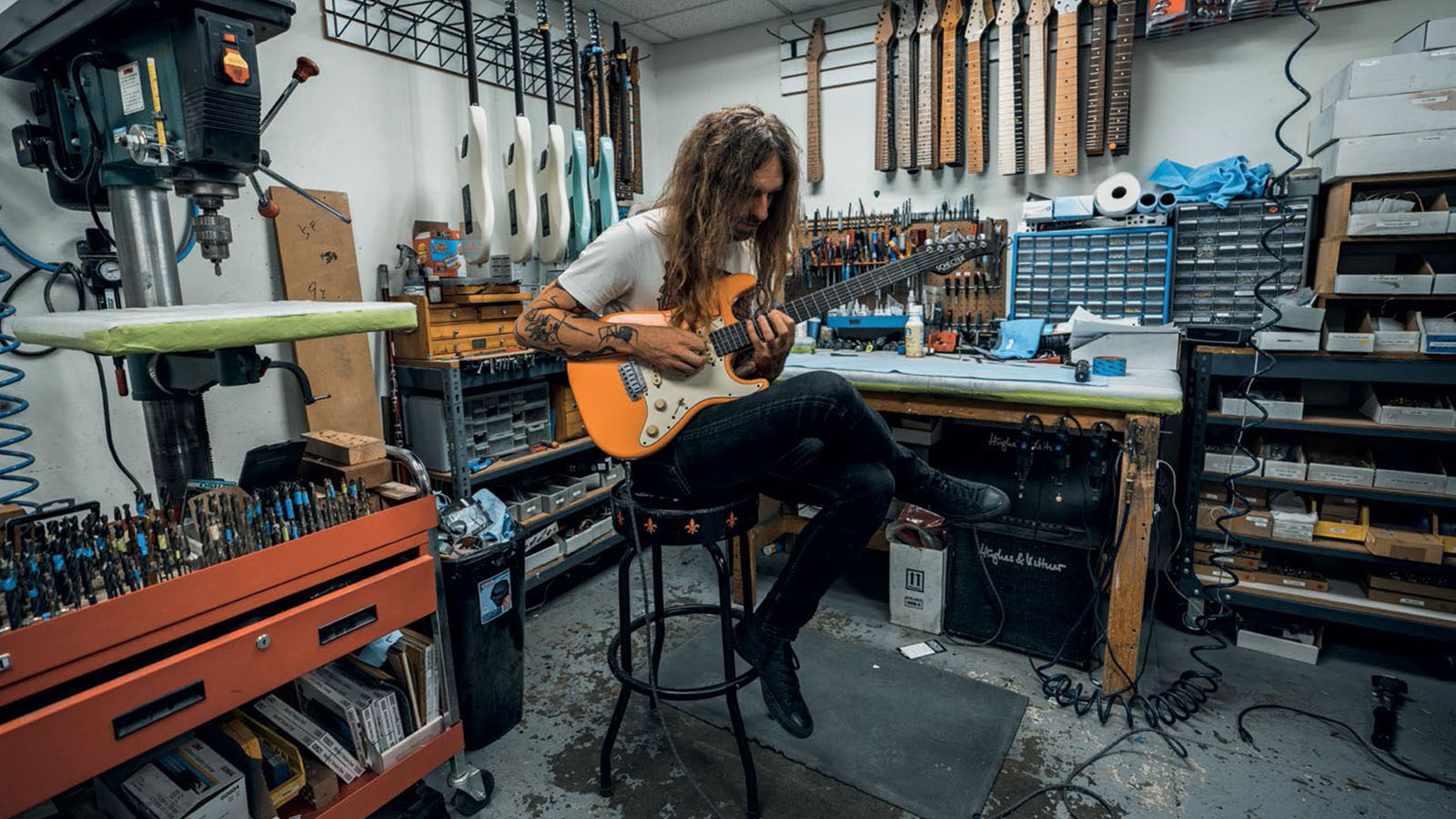Nick Johnston: "I didn’t have a lot of money growing up - you learn to make gear sound good with what you have"
The instrumental master sheds light on his signature Schecter, songwriting and majestic new album, Wide Eyes in the Dark

Nick Johnston has always occupied two worlds simultaneously - a Schrödinger’s Cat of Shred, if you will. Is he a highly capable, achingly melodic and sometimes blazingly fast guitar hero for the modern age? Or is he a composer exploring new levels of melody, harmony and orchestration?
With Johnston, you never know until you hit play. On his latest album, Wide Eyes in the Dark, we find more of the compositional, fusion-esque Johnston rather than the ‘How does he do that?’ shred lord, and yet there are still plenty of licks and tricks, as on previous albums like Remarkably Human and Atomic Mind. It’s just that they’re couched in music that is almost cinematic in its scope and ambition.
“Writing music is kind of like a therapy,” Johnston says. “I value that above everything. This is my fifth record, and some of the others felt like they were showing different facets of the same gem, but this one stands out to me and it’s hard to pinpoint why. There are more of the majestic melodies, more of the quiet sections.”
A big contributor to this was Johnston’s decision to compose on the keyboard. “When you have played guitar your whole life, you develop a certain amount of technique and you tend to rely on that,” he says.
“When you play your instrument, there are certain things you will fall back on. But when you’re in the situation where you completely remove your main instrument and you’re sitting behind an instrument where you basically look like your dad typing on an iPhone, that’s me at a keyboard!
"You’re completely stripped of any confidence of performance, so you just have to really listen. I just love the idea of not having a traditional sort of instrumental guitar shred melodies. I’m over that stuff right now and I want just real simple. So I really focused on the harmony.

"I think every song on that album has a new sort of approach to harmony that I’ve never really messed with before. And that’s huge. Even if people don’t like the music, it’s a huge accomplishment for me, just because each song has something new harmonically for me - after writing five instrumental albums.”
Get The Pick Newsletter
All the latest guitar news, interviews, lessons, reviews, deals and more, direct to your inbox!
The approach may have changed, but Johnston’s guitar of choice remains his Schecter USA signature model, which on the surface appears quite Strattish but - as with anything Johnston puts his creativity into - has plenty of twists.
“When we first started, I was concerned with making it too much like a Strat, but that’s what I always played and there was not a ton of stuff I really had any interest in changing.
I didn’t have a lot of money growing up, so I just kept it simple with gear, and you learn to make it sound good with what you have
"But then you realize there are so many variables. We got rid of one of the knobs, so it’s just one tone and one volume. We moved the input jack to the base of the guitar and took more of a modern approach to the construction methods. If you take the pickguard off and look at the guts, it’s beautiful!
"It’s made by a Japanese builder at the Custom Shop and you can see his focus and his training and the way his workflow all comes together at the very end of the process. It’s so clean. And then it’s got that modern neck shape with Macassar ebony fingerboard, a 14-inch radius neck and custom Schecter pickups that we voiced together.”
Johnston favors Mesa/Boogie Lonestar and Triple Crown amplifiers, although his touring schedule takes him to parts of the world where it might not necessarily be easy to get his hands on his preferred models, so an MXR reverb pedal is always on hand to add a little familiarity to whatever rental amp he may be landed with.
“I have a Kemper Profiler at home and it’s useful, but there’s something about digital that doesn’t feel right to me when I’m playing with a drummer. I would look at it like, you know, analog gear is that nice sine wave and then all the digital gear is a square wave. So you’ve basically cut off so much of that natural organic frequency stuff that’s happening in the air. And I think that’s what I want.
“I look back on my favorite guitar tones like Eddie Van Halen’s old Marshall or Stevie Ray Vaughan’s sound… the best tone I’ve ever heard live was Jeff Beck, who uses just plain and simple gear, just a Strat into a Marshall, some witchcraft here and there, but he’s not running a huge fridge and 20 things in series and parallel.
"I didn’t have a lot of money growing up, so I just kept it simple with gear, and you learn to make it sound good with what you have. Your hands get stronger, your ears get a little bit more refined and you find your voice.”
Peter Hodgson is a journalist, an award-winning shredder, an instructional columnist, a guitar teacher, a guitar repair guy, a dad and an extremely amateur barista. He runs a blog, I Heart Guitar, which allows him to publicly geek out over his obsessions. Peter is from Melbourne, Australia, where he writes for various magazines, including Guitar World.
“I suppose I felt that I deserved it for the amount of seriousness that I’d put into it. My head was huge!” “Clapton is God” graffiti made him a guitar legend when he was barely 20 – he says he was far from uncomfortable with the adulation at the time
“I was in a frenzy about it being trapped and burnt up. I knew I'd never be able to replace it”: After being pulled from the wreckage of a car crash, John Sykes ran back to his burning vehicle to save his beloved '76 Les Paul









